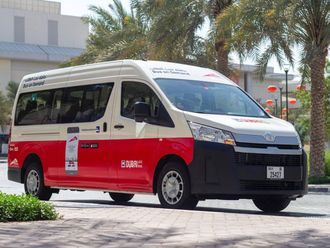Abu Dhabi: As of 2009, the Department of Transport (DoT) began implementing a new paid parking system. This effectively began in the capital’s downtown area, near what is locally recognised as Hamdan Street.
Here, residents were accustomed to parallel parking in the middle of the road, leaving their vehicles overnight on unmarked sandy areas and parking in otherwise disruptive ways. However, after the introduction of Mawaqif, the parking lot orientation changed drastically, increasing the number of parallel parking spaces, and the issuing of tickets to those who did not abide by the new parking rules.
A couple of years into the Mawaqif initiative, residents were quite unhappy with the changes and having to pay the hourly tariff. Although much of their animosity remains until today, more are admitting to the positive outcomes that have resulted since the project’s launch.
The Mawaqif elements
1) Motorists can only park on curbstones painted turquoise and white or black. The white and turquoise colours indicate Premium Parking areas where residents can only park for a maximum of four hours and pay Dh3 an hour. Meanwhile, white and turquoise curbstones indicate Standard Parking areas that charge Dh2 an hour. However, parking spaces bordered by a blue line mean that after 9pm, these spaces are for tenants living in the buildings surrounding the respective parking sectors.
2) Each household is entitled to two resident permits that allow them to park in the blue-bordered spots overnight. Issuing a permit for the first vehicle costs Dh800 and the second is priced at Dh1,200. The necessary documents for this process include providing a passport copy with a valid residency visa, a lease of contract or proof of residency ownership, the most recent electric bill, proof of vehicle ownership and connection to the owner in case it is not the same person whose name is in the tenancy contract.
Non-area residents parked in blue-bordered spots after 9pm may have their vehicles towed away.
3) There are currently several methods of payment when using a paid-parking Mawaqif spot.
a) Coins: Single dirhams, Dh0.5 and Dh0.25 coins are all accepted by the parking machines.
b) Online payment: Additionally, customers can create an online account on the Mawaqif website through which they can make payments for their vehicles depending on the area they have parked in (premium or standard) where different tariffs apply.
c) Rechargeable cards: Rechargeable cards worth Dh50 and pre-paid Mawaqif cards worth Dh50 and Dh100 with an equal amount of credit, can be purchased from the different customer service centres located across the city. Rechargeable cards can be linked to users’ Mawaqif account, allowing them to keep topping up their cards’ balance.
d) SMS: Motorists can also pay by sending an SMS to 3009 in the format [Vehicle Plate Colour and Category][Space][P or S for Premium or Standard parking][space][Number of Hours]. Users will then receive a confirmation SMS that their transaction has been completed followed by a reminder 10 minutes before the parking ticket expires.
e) Credit cards: The most recent payment option introduced by the DoT in February 2013 allows individuals to use their credit cards across 2,000 machines.
In the capital, so far, parking at malls is not chargeable. Fridays and public holidays are also free of charge for all, although residents’ parking rule applies throughout the week.












